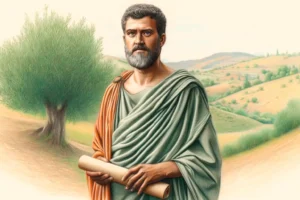
Mark (John Mark): Companion of Barnabas and Paul, Author of the Gospel of Mark
Mark, also known as John Mark, was a companion of Barnabas and Paul and is traditionally believed to be the author of the Gospel of Mark. His life and work played a significant role in the early Christian movement and the spread of the Gospel.
Quick Facts
- Also Known as John Mark: He is referred to as both Mark and John Mark in the New Testament.
- Companion of Paul and Barnabas: He traveled with Paul and Barnabas on their missionary journeys.
- Author of the Gospel of Mark: He is traditionally credited with writing the Gospel of Mark, one of the four canonical Gospels.
- Son of Mary: His mother, Mary, hosted an early Christian church in her home in Jerusalem.
- Conflict and Reconciliation: Mark left Paul and Barnabas during their first missionary journey but later reconciled with Paul.
- Close Association with Peter: Mark is believed to have been a close associate of Peter, from whom he may have received much of the material for his Gospel.
- Evangelist to Egypt: Tradition holds that Mark founded the Church in Alexandria, Egypt.
- Legacy: Mark’s Gospel is known for its concise, action-oriented narrative, focusing on the deeds of Jesus.
Background and Early Life
Mark, referred to as John Mark in Acts, was the son of a woman named Mary, who hosted an early Christian community in her home in Jerusalem (Acts 12:12). This suggests that Mark grew up in a devout Jewish-Christian environment, surrounded by key figures of the early Church.
Companion of Paul and Barnabas
Mark first appears in the New Testament as a companion of Paul and Barnabas. He accompanied them on their first missionary journey but left them in Pamphylia and returned to Jerusalem (Acts 13:13). This departure later caused a sharp disagreement between Paul and Barnabas, leading them to part ways (Acts 15:37-39). Barnabas took Mark with him to Cyprus, while Paul chose Silas as his new companion.
Reconciliation with Paul
Despite the initial conflict, Mark and Paul eventually reconciled. In his later letters, Paul speaks positively of Mark, indicating that he had become a valuable co-worker (Colossians 4:10, Philemon 1:24). Paul even requests Mark’s presence during his final imprisonment in Rome, acknowledging his usefulness in ministry (2 Timothy 4:11).
Association with Peter
Mark is also closely associated with Peter, one of Jesus’ chief apostles. Peter refers to Mark as “my son” in 1 Peter 5:13, suggesting a strong mentor-mentee relationship. Early Christian tradition holds that Mark’s Gospel is based on the teachings and recollections of Peter, providing a firsthand account of Jesus’ life and ministry.
Author of the Gospel of Mark
The Gospel of Mark is traditionally attributed to John Mark. This Gospel is known for its concise and straightforward narrative, focusing on the actions of Jesus rather than extensive discourses. It is considered the earliest of the four Gospels and serves as a source for the Gospels of Matthew and Luke.
Evangelist to Egypt
According to tradition, Mark played a foundational role in the spread of Christianity to Africa. He is credited with establishing the Church in Alexandria, Egypt, one of the most significant centers of early Christianity. His work in Alexandria contributed to the growth of a vibrant Christian community that influenced the wider Church for centuries.
Theological Themes in the Gospel of Mark
- Jesus as the Suffering Servant: Mark emphasizes Jesus’ role as the suffering servant who came to give His life as a ransom for many (Mark 10:45).
- Immediacy and Action: The Gospel frequently uses the term “immediately,” creating a sense of urgency and continuous action in Jesus’ ministry.
- The Messianic Secret: Mark often depicts Jesus instructing people to keep His identity as the Messiah a secret until the appropriate time (Mark 1:34, 8:30).
- Discipleship: The Gospel portrays the disciples’ journey of understanding and following Jesus, highlighting both their failures and growth in faith.
Legacy and Impact
Mark’s contributions to the early Church and his authorship of the second Gospel have left a lasting legacy. His Gospel provides a foundational account of Jesus’ life, ministry, death, and resurrection, which has been instrumental in shaping Christian theology and practice. Mark’s role as an evangelist and church leader underscores his importance in the spread of early Christianity.
Conclusion
Mark, also known as John Mark, was a significant figure in the early Christian movement. As a companion of Paul and Barnabas, author of the Gospel of Mark, and an evangelist to Egypt, his contributions have had a profound and enduring impact on the Church and the spread of the Gospel.



